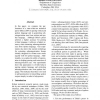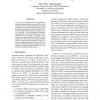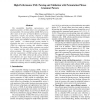CASCON
2006
14 years 4 months ago
2006
Parsing context-dependent computer languages requires an ability to maintain and query data structures while parsing for the purpose of influencing the parse. Parsing ambiguous co...
ACL
2006
14 years 4 months ago
2006
Most of the work on treebank-based statistical parsing exclusively uses the WallStreet-Journal part of the Penn treebank for evaluation purposes. Due to the presence of this quasi...
ACL
2006
14 years 4 months ago
2006
In this paper, we compare the performance of a state-of-the-art statistical parser (Bikel, 2004) in parsing written and spoken language and in generating subcategorization cues fr...
NAACL
2007
14 years 4 months ago
2007
We present several improvements to unlexicalized parsing with hierarchically state-split PCFGs. First, we present a novel coarse-to-fine method in which a grammar’s own hierarc...
ICWS
2008
IEEE
14 years 4 months ago
2008
IEEE
The extensibility, flexibility, expressiveness, and platform-neutrality of XML delivers key advantages for interoperability. The interoperability of XML Web services often comes a...
EMNLP
2008
14 years 4 months ago
2008
We present a study on how grammar binarization empirically affects the efficiency of the CKY parsing. We argue that binarizations affect parsing efficiency primarily by affecting ...
EMNLP
2007
14 years 4 months ago
2007
We present experiments with a dependency parsing model defined on rich factors. Our model represents dependency trees with factors that include three types of relations between t...
EMNLP
2007
14 years 4 months ago
2007
We describe an incremental parser that was trained to minimize cost over sentences rather than over individual parsing actions. This is an attempt to use the advantages of the two...
COLING
2008
14 years 4 months ago
2008
State-of-the-art statistical parsing models applied to free word-order languages tend to underperform compared to, e.g., parsing English. Constituency-based models often fail to c...
COLING
2008
14 years 4 months ago
2008
Most data-driven dependency parsing approaches assume that sentence structure is represented as trees. Although trees have several desirable properties from both computational and...



